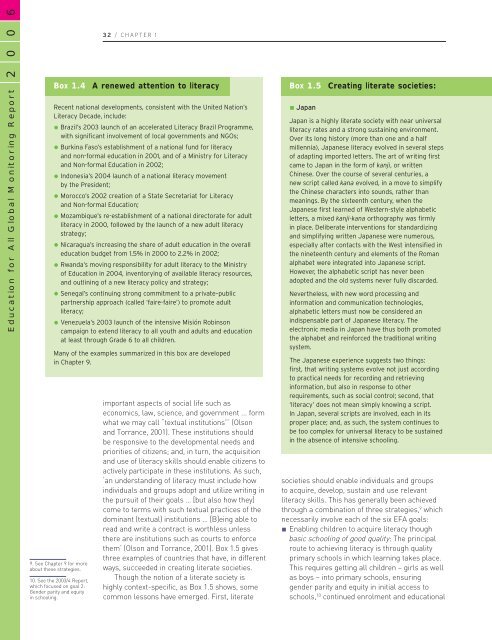literacy for life; EFA global monitoring report, 2006 - Institut de ...
literacy for life; EFA global monitoring report, 2006 - Institut de ...
literacy for life; EFA global monitoring report, 2006 - Institut de ...
You also want an ePaper? Increase the reach of your titles
YUMPU automatically turns print PDFs into web optimized ePapers that Google loves.
0<br />
0<br />
6<br />
32 / CHAPTER 1<br />
2<br />
Education <strong>for</strong> All Global Monitoring Report<br />
Box 1.4<br />
Recent national <strong>de</strong>velopments, consistent with the United Nation’s<br />
Literacy Deca<strong>de</strong>, inclu<strong>de</strong>:<br />
Brazil’s 2003 launch of an accelerated Literacy Brazil Programme,<br />
with significant involvement of local governments and NGOs;<br />
Burkina Faso’s establishment of a national fund <strong>for</strong> <strong>literacy</strong><br />
and non-<strong>for</strong>mal education in 2001, and of a Ministry <strong>for</strong> Literacy<br />
and Non-<strong>for</strong>mal Education in 2002;<br />
Indonesia’s 2004 launch of a national <strong>literacy</strong> movement<br />
by the Presi<strong>de</strong>nt;<br />
Morocco’s 2002 creation of a State Secretariat <strong>for</strong> Literacy<br />
and Non-<strong>for</strong>mal Education;<br />
Mozambique’s re-establishment of a national directorate <strong>for</strong> adult<br />
<strong>literacy</strong> in 2000, followed by the launch of a new adult <strong>literacy</strong><br />
strategy;<br />
Nicaragua’s increasing the share of adult education in the overall<br />
education budget from 1.5% in 2000 to 2.2% in 2002;<br />
Rwanda’s moving responsibility <strong>for</strong> adult <strong>literacy</strong> to the Ministry<br />
of Education in 2004, inventorying of available <strong>literacy</strong> resources,<br />
and outlining of a new <strong>literacy</strong> policy and strategy;<br />
Senegal’s continuing strong commitment to a private–public<br />
partnership approach (called ‘faire-faire’) to promote adult<br />
<strong>literacy</strong>;<br />
Venezuela’s 2003 launch of the intensive Misión Robinson<br />
campaign to extend <strong>literacy</strong> to all youth and adults and education<br />
at least through Gra<strong>de</strong> 6 to all children.<br />
9. See Chapter 9 <strong>for</strong> more<br />
about these strategies.<br />
10. See the 2003/4 Report,<br />
which focused on goal 2:<br />
Gen<strong>de</strong>r parity and equity<br />
in schooling.<br />
A renewed attention to <strong>literacy</strong><br />
Many of the examples summarized in this box are <strong>de</strong>veloped<br />
in Chapter 9.<br />
important aspects of social <strong>life</strong> such as<br />
economics, law, science, and government ... <strong>for</strong>m<br />
what we may call “textual institutions”’ (Olson<br />
and Torrance, 2001). These institutions should<br />
be responsive to the <strong>de</strong>velopmental needs and<br />
priorities of citizens; and, in turn, the acquisition<br />
and use of <strong>literacy</strong> skills should enable citizens to<br />
actively participate in these institutions. As such,<br />
‘an un<strong>de</strong>rstanding of <strong>literacy</strong> must inclu<strong>de</strong> how<br />
individuals and groups adopt and utilize writing in<br />
the pursuit of their goals … [but also how they]<br />
come to terms with such textual practices of the<br />
dominant (textual) institutions … [B]eing able to<br />
read and write a contract is worthless unless<br />
there are institutions such as courts to en<strong>for</strong>ce<br />
them’ (Olson and Torrance, 2001). Box 1.5 gives<br />
three examples of countries that have, in different<br />
ways, succee<strong>de</strong>d in creating literate societies.<br />
Though the notion of a literate society is<br />
highly context-specific, as Box 1.5 shows, some<br />
common lessons have emerged. First, literate<br />
Box 1.5<br />
Japan<br />
Creating literate societies:<br />
Japan is a highly literate society with near universal<br />
<strong>literacy</strong> rates and a strong sustaining environment.<br />
Over its long history (more than one and a half<br />
millennia), Japanese <strong>literacy</strong> evolved in several steps<br />
of adapting imported letters. The art of writing first<br />
came to Japan in the <strong>for</strong>m of kanji, or written<br />
Chinese. Over the course of several centuries, a<br />
new script called kana evolved, in a move to simplify<br />
the Chinese characters into sounds, rather than<br />
meanings. By the sixteenth century, when the<br />
Japanese first learned of Western-style alphabetic<br />
letters, a mixed kanji-kana orthography was firmly<br />
in place. Deliberate interventions <strong>for</strong> standardizing<br />
and simplifying written Japanese were numerous,<br />
especially after contacts with the West intensified in<br />
the nineteenth century and elements of the Roman<br />
alphabet were integrated into Japanese script.<br />
However, the alphabetic script has never been<br />
adopted and the old systems never fully discar<strong>de</strong>d.<br />
Nevertheless, with new word processing and<br />
in<strong>for</strong>mation and communication technologies,<br />
alphabetic letters must now be consi<strong>de</strong>red an<br />
indispensable part of Japanese <strong>literacy</strong>. The<br />
electronic media in Japan have thus both promoted<br />
the alphabet and rein<strong>for</strong>ced the traditional writing<br />
system.<br />
The Japanese experience suggests two things:<br />
first, that writing systems evolve not just according<br />
to practical needs <strong>for</strong> recording and retrieving<br />
in<strong>for</strong>mation, but also in response to other<br />
requirements, such as social control; second, that<br />
‘<strong>literacy</strong>’ does not mean simply knowing a script.<br />
In Japan, several scripts are involved, each in its<br />
proper place; and, as such, the system continues to<br />
be too complex <strong>for</strong> universal <strong>literacy</strong> to be sustained<br />
in the absence of intensive schooling.<br />
societies should enable individuals and groups<br />
to acquire, <strong>de</strong>velop, sustain and use relevant<br />
<strong>literacy</strong> skills. This has generally been achieved<br />
through a combination of three strategies, 9 which<br />
necessarily involve each of the six <strong>EFA</strong> goals:<br />
Enabling children to acquire <strong>literacy</strong> though<br />
basic schooling of good quality: The principal<br />
route to achieving <strong>literacy</strong> is through quality<br />
primary schools in which learning takes place.<br />
This requires getting all children – girls as well<br />
as boys – into primary schools, ensuring<br />
gen<strong>de</strong>r parity and equity in initial access to<br />
schools, 10 continued enrolment and educational

















